INTERVIEW: Coalition General Felix Gedney on preparing Iraq for life after ISIS
Deputy Commander, Strategy and Support for Operation Inherent Resolve talks to The Defense Post about policing, searching for ISIS leaders and IEDs in Iraq and Syria
- Tens of thousands of Iraqi police will be trained to take over security from the military
- Coalition plans for Kurdish Peshmerga to be absorbed into Iraqi federal forces
- Iraqis search for ISIS leaders who escaped by blending in with the civilian population
- IEDs remain a threat to civilians ‘eager’ to return home in Iraq and Syria
The U.S.-led Coalition military campaign against Islamic State in Iraq and Syria is winding down: on November 26, the Coalition conducted no air, ground or artillery strikes against ISIS for the first time since Operation Inherent Resolve began in 2014, and both Iraqi Prime Minister Haider al-Abadi and the Russians supporting Syrian President Bashar al-Assad have claimed victory against the terrorist group.
Major General Felix Gedney, Deputy Commander-Strategy and Support (S&S) Combined Joint Task Force – Operation Inherent Resolve, spoke to The Defense Post on December 20 about where the campaign against ISIS stands now, the future of Iraqi security and the threats still facing civilians in Iraq and Syria.

Before serving as deputy commander with CJTF – OIR, Gedney was the U.K. Chief of Defence Staff’s Liasion Officer with the U.S. Joint Staff in Washington, Deputy Commander of the U.S. 1st Infantry Division in Fort Riley, Kansas and commander of the Royal Scots Dragoon Guards. He served a 12-month tour as Deputy Commander of Regional Command East in Afghanistan, Deputy Commander for Support and Base Commander of Bagram Air Base, and tours in Northern Ireland, Cyprus, the Balkans, and Iraq. He has also worked at the U.K. Ministry of Defence in London, NATO Allied Rapid Reaction Corps headquarters and at the United Nations in New York.

TDP: What is your role with the Coalition and how long have you been in it?
FG: I’m a British Army officer. I’m the Deputy Commander for Strategy and Support of CJTF-OIR, and I’ve been in that role for nearly four months now.
How has your role changed in the last few months?
The biggest thing is, of course, the future plan because we’ve had some significant developments in the campaign over the last months with the success that partner forces have had against ISIS, both in Iraq and Syria. In Iraq the Iraqi Security Forces have had a rapid series of successes since the fall of Mosul, with Tal Afar, Hawija and Anbar all falling to the Iraqi Security Forces. And most recently, Iraqi Prime Minister Abadi has announced the liberation of Iraq, and held a parade last weekend to celebrate that.
Why are Coalition actions continuing even though Russia (in Syria) and Iraq have said they are defeated?
The Russians made a claim that ISIS has been defeated; that is simply not true. ISIS has not been defeated in Syria. We are still fighting against ISIS in the Euphrates River Valley, and they still present a very real threat to the people of Syria as well as to the region and to our home nations.
Is there any danger of ISIS fighters continuing to cross between Iraq and Syria where the border has been porous?
Yes, there is, and the Iraqi Security Forces are working to secure their border now. When we say Iraq is ‘liberated,’ we need to understand that that does not mean that ISIS has been defeated in Iraq. They continue to present a threat, the Iraqi Security Forces and the Coalition continue to fight against the remnants of ISIS as well as supporting the Iraqi Security Forces in their operations to secure the areas liberated and consolidate the gains they’ve made.

How are you training Iraqi forces for a possible future counter-insurgency fight?
As we’ve got to what is the last bit of the major combat operations – those big maneuver operations where we’ve worked by, with, and through the Iraqi Security Forces – we’ve been training and providing equipment to the Iraqi Security Forces all through that, but there’s a renewed effort now to make sure we build the right capabilities for the Iraqi Security Forces to deal with whatever follows.
ISIS is likely to attempt some sort of insurgency, and we’re building the right capabilities so they can do that, eventually with a much lower level of international military support, and involves such things as building intelligence, logistics, some of the medical and engineering, but also importantly it’s about training police, so moving away from some of the ‘green training,’ and training police and border guards so that the security can be preserved by non-military structures rather than the army.
How many police have you trained so far?
We continue to train the police, and it’s around just over 25,000 police trained so far. That includes not only federal forces, but local police, and it’s a large organization. There are large numbers of police here. And that 25,000 is only a fraction of the police that a country the size of Iraq will need.

Have you had to retrain the entire police force from the ground up?
There were police forces remaining, and there’s a very effective federal police force [and] there are local police. We’ve trained parts of it. We’re never going to train all of the Iraqi police forces, so we’ve trained parts of it but we are increasing the numbers of police we’re training, and that effort has been led by non-military police trainers, mostly, and in particular led by the Italian carabinieri [within the coalition].
Do you know how many will eventually need to be trained?
We’re still working through what the future security structures will be, and the government of Iraq will decide how many police they need, both federal police and local police. There is a limit to the number that we will train, because of course we have limited resources, but the final number we don’t know yet.
Will there still be training for the Iraqi Peshmerga?
We expect the training to continue in the Kurdish region of Peshmerga. We expect that at some point in the future they will revert to being federal forces and so we will train the security structures that will provide the security and maintain the defeat of Daesh in the Kurdish region the same as we will for the rest of the country.

What kind of training do the local police forces need?
One of the things is that much of the security of this country through the past few years and the liberation battles has been provided by military forces. It’s been military tactics that have provided security, and what we now need to do is we need to make sure that those providers of security are providing it through police functions. We won’t in the near future get to simple community policing, but that needs to be more of a part of the provision of security. It’s right that we have blue [civilian] police providing security, particularly in the urban areas, with the military off the streets.
Will it be counter-terrorism police?
It needs to be local police providing the normal security. There’s still a place absolutely for counter-terrorist forces to make sure that the public remain safe, and to complete the defeat of Daesh because they’re still there. Some of the fighters have effectively molded back into the population that they used to terrorize and are hiding within the human terrain. The security provided in those liberated areas is absolutely essential to enable people to return. The large number of IDPs that remain in the country, one of the factors in getting them back is making sure there’s appropriate security that they feel reassured by.
Are you concerned about the number of ISIS fighters who may have blended back in with the population?
Yes, we’re aware that there are a number of fighters that have deserted the battlefield. Many of the leaders just molded back into the population, sometimes using the movement of displaced people and refugees to give them a route out, and we now need to find them. That process is happening. We’ve been very effective at hunting them down and taking them off the battlefield.
Is that search a military or policing action?
It’s both. There’s elements of military at times but also many of the specialist police forces – the SWAT teams and things like that – are doing those operations. It’s very much now moving toward more of an intelligence-led operation, and when we find and get enough intelligence they are acted on, and sometimes that’s police and sometimes that’s military.
It’s very important that we build the right structures for our partner forces so they can do that themselves. Quite a lot of it has been provided by the Coalition, and our capabilities, and we need to build those capabilities within our partner forces so they can do it without us.
Where do the Iraqis’ capabilities stand now?
I think they’re at a very good place. They have a very strong government. The Iraqi Security Forces have been really successful on the battlefield – they’re confident, they’re capable, they’re professional. There are some capabilities there where they have gaps that we can fill, where some of the things we’ve been providing for them we now need to make sure they can do themselves. But I’m confident the Iraqi Army and the other security forces are a very effective fighting force.

How is the deployment of the border guard in a box going?
It’s going very well. We’ve started training border guards on it, and now that the Iraqi forces have secured certainly the northern part of their border with Syria, we’ll be using those as soon as we’ve got the border guards out on the border. It’s a great concept – it was thought up by one of the general officers here on the last tour, and we believe that’s going to be a significant capability to help secure the border.
What’s the situation like for people returning home?
The situation is obviously different in different places. In many of the liberated areas ISIS seeded those areas with thousands of improvised explosive devices, and that legacy continues their fight after they’ve gone.
That is one of the major challenges we have to get over to get people to return. The UNDP [United Nations Development Programme] are doing a magnificent job in enabling returns, and they have had huge success in those areas where they’ve been able to work and they’ve been funded to work; they’ve managed to get people back very effectively, as well as making sure the IEDs are clear. We talked about making sure that there is the right security there, and we also need to make sure that the basic services are there to enable them to return.
Very simply put, we have to make sure that we provide appropriate levels of security and livelihoods that persuade the population that they are better under the legitimate government after ISIS than they were under ISIS. If we can’t do that and if we can’t win the people, we lose the campaign.
That’s largely a non-military task. It’s the non-military organizations that lead in that respect, but our part of that is to support them and to make sure that we provided the right security, both for people to return and for those humanitarian and stabilization organizations to work.
Have you seen that people are eager to return home?
They are when the conditions are right, absolutely. When the conditions are right, they return. On the whole people are very keen to return as soon as the conditions are right, and one of the challenges we have, for example in Raqqa, is that people are keen to return before the conditions are right. As winter approaches people are keen to get back where there are homes to move back to, they’re very keen to go back and check their property, and that can present a risk to us as well because of course we want to make sure that the area is safe before they move back.
There has been some criticism of the Raqqa police and Coalition for not allowing people to return home. Are you still seeing casualties from IEDs when people go back?
Yes. We’re seeing a lot of casualties in Raqqa from improvised explosive devices as people try to return. And we look at this battle as a continuation of ISIS’s battle. They’ve managed to continue to terrorize the population even after they’ve left the battlespace.
INTERVIEW: US General Andrew Croft on 3 years of Iraqi armed forces progress


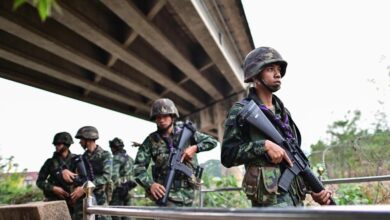

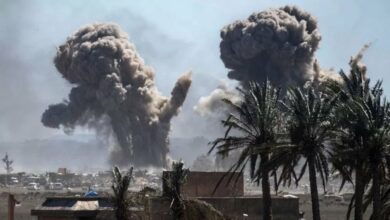
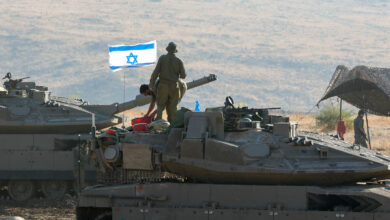
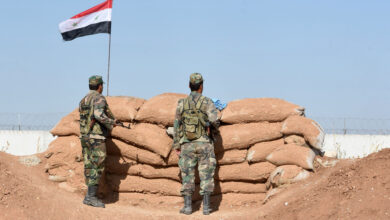
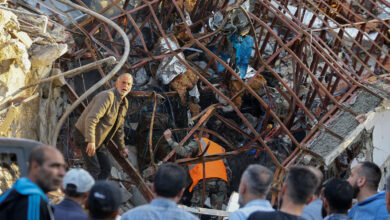

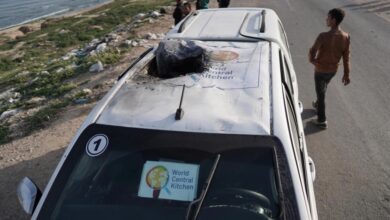
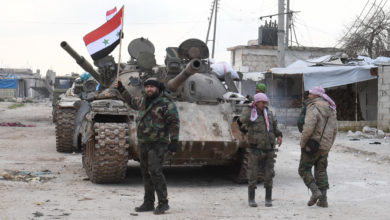

4 Comments